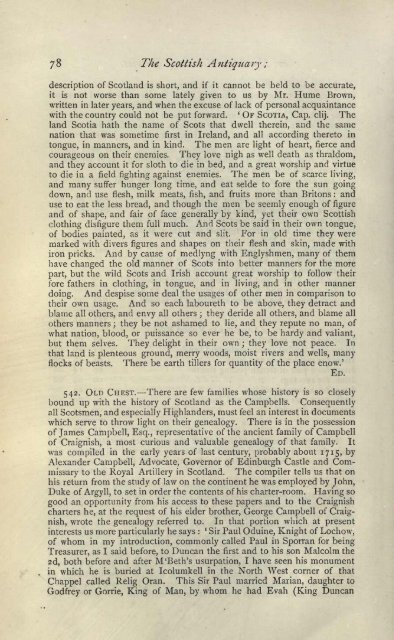Create successful ePaper yourself
Turn your PDF publications into a flip-book with our unique Google optimized e-Paper software.
78<br />
The Scottish Antiquary ;<br />
description of <strong>Scotland</strong> is short, and if it cannot be held <strong>to</strong> be accurate,<br />
it is not worse than some lately given <strong>to</strong> us by Mr. Hume Brown,<br />
written in later years, and when the excuse of lack of personal acquaintance<br />
'<br />
with the country could not be put forward. OF SCOTIA, Cap. clij. The<br />
land Scotia hath the name of Scots that dwell therein, and the same<br />
nation that was sometime first in Ireland, and all according there<strong>to</strong> in<br />
<strong>to</strong>ngue, in manners, and in kind. The men are light of heart, fierce and<br />
courageous on their enemies. They love nigh as well death as thraldom,<br />
and they account it for sloth <strong>to</strong> die in bed, and a great worship and virtue<br />
<strong>to</strong> die in a field fighting against enemies. The men be of scarce living,<br />
and many suffer hunger long time, and eat selde <strong>to</strong> fore the sun going<br />
down, and use flesh, milk meats, fish, and fruits more than Bri<strong>to</strong>ns : and<br />
use <strong>to</strong> eat the less bread, and though the men be seemly enough of figure<br />
and of shape, and fair of face generally by kind, yet their own Scottish<br />
clothing disfigure them full much. And Scots be said in their own <strong>to</strong>ngue,<br />
of bodies painted, as it were cut and slit. For in old time they were<br />
marked with divers figures and shapes on their flesh and skin, made with<br />
iron pricks. And by cause of medlyng with Englyshmen, many of them<br />
have changed the old manner of Scots in<strong>to</strong> better manners for the more<br />
part, but the wild Scots and Irish account great worship <strong>to</strong> follow their<br />
fore fathers in clothing, in <strong>to</strong>ngue, and in living, and in other manner<br />
doing. And despise some deal the usages of other men in comparison <strong>to</strong><br />
their own usage. And so each laboureth <strong>to</strong> be above, they detract and<br />
blame all others, and envy all others ; they deride all others, and blame all<br />
others manners ; they be not ashamed <strong>to</strong> lie, and they repute no man, of<br />
what nation, blood, or puissance so ever he be, <strong>to</strong> be hardy and valiant,<br />
but them selves. They delight in their own ; they love not peace. In<br />
that land is plenteous ground, merry woods, moist rivers and wells, many<br />
flocks of beasts. There be earth tillers for quantity of the place enow.'<br />
ED.<br />
542. OLD CHEST. There are few families whose his<strong>to</strong>ry is so closely<br />
bound up with the his<strong>to</strong>ry of <strong>Scotland</strong> as the Campbells. Consequently<br />
all Scotsmen, and especially Highlanders, must feel an interest in documents<br />
which serve <strong>to</strong> throw light on their genealogy. There is in the possession<br />
of James Campbell, Esq., representative of the ancient family of Campbell<br />
of Craignish, a most curious and valuable genealogy of that family. It<br />
was compiled in the early years of last century, probably about 1715, by<br />
Alexander Campbell, Advocate, Governor of Edinburgh Castle and Commissary<br />
<strong>to</strong> the Royal Artillery in <strong>Scotland</strong>. The compiler tells us that on<br />
his return from the study of law on the continent he was employed by John,<br />
Duke of Argyll, <strong>to</strong> set in order the contents of his charter-room. Having so<br />
good an opportunity from his access <strong>to</strong> these papers and <strong>to</strong> the Craignish<br />
charters he, at the request of his elder brother, George Campbell of Craignish,<br />
wrote the genealogy referred <strong>to</strong>. In that portion which at present<br />
'<br />
interests us more particularly he : says Sir Paul Oduine, Knight of Lochow,<br />
of whom in my introduction, commonly called Paul in Sporran for being<br />
Treasurer, as I said before, <strong>to</strong> Duncan the first and <strong>to</strong> his son Malcolm the<br />
2d, both before and after M'Beth's usurpation, I have seen his monument<br />
in which he is buried at Icolumkell in the North West corner of that<br />
Chappel called Relig Oran. This Sir Paul married Marian, daughter <strong>to</strong><br />
Godfrey or Gorrie, King of Man, by whom he had Evah (King Duncan

















